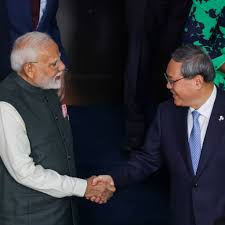PM Modi takes aim at China’s rare-earth stranglehold: ‘Prevent weaponisation’

PM Modi Warns Against China’s Rare-Earth Monopoly: “Prevent Weaponisation”
In a strong policy statement, Prime Minister Narendra Modi has warned the world about China’s growing control over rare-earth minerals. He urged democratic nations to work together to “prevent the weaponisation” of these essential resources.
Speaking at an international forum in New Delhi on critical minerals, Modi emphasized the risks of relying too heavily on a single supplier. Though he didn’t mention China by name, the reference was clear. China currently dominates the rare-earth industry and holds a powerful grip over these resources.
What Are Rare-Earths and Why They Matter
Rare-earth elements are crucial for modern technology. They power smartphones, electric vehicles, wind turbines, and even fighter jets. While not actually rare in nature, these metals are difficult to extract and refine.
China controls over 60% of global mining and nearly 90% of the processing. This dominance gives it significant control over global industries. In the past, China has limited exports of these materials during diplomatic disputes. That has raised alarms across the globe.
India’s Strong Stand
“We must not allow critical minerals to become tools of coercion or control,” Modi said. “They should support cooperation and progress—not dominance.”
India has its own reserves of rare-earth elements, mainly along the eastern coast. But so far, they remain underused. This is due to tough regulations, limited private investment, and lack of modern infrastructure.
Modi’s speech signals a major policy shift. The government now plans to boost rare-earth production and processing. New reforms are expected to open up mining to private players and encourage foreign investment.
Building Global Partnerships
India is also strengthening ties with nations like the US, Australia, and Japan. These partnerships aim to reduce dependency on China and build secure supply chains. Through the Quad alliance, India is exploring joint ventures and shared technology efforts.
Modi called for a united global effort. “Let us build transparent and resilient supply chains,” he said. “India is ready to lead and partner with all like-minded nations.”
India is also looking at Africa and Latin America. Talks are underway with countries like Namibia and Brazil for rare-earth cooperation. These steps will help diversify India’s mineral sources and reduce risks.
The Race for Critical Resources
As the world shifts toward clean energy, demand for rare-earths is rising fast. The International Energy Agency expects demand to grow sixfold by 2040. Countries need these minerals to build electric motors, solar panels, and batteries.
China’s recent restrictions on other minerals like gallium and germanium have added to global worries. These moves show how minerals can become tools of geopolitical power. Modi’s message comes at a critical time.
Industry Experts Applaud Modi’s Push
Many experts see Modi’s remarks as a wake-up call. “India has strong potential in rare-earths, but we need bold action,” said Rahul Mehta, a mining industry analyst. “With the right policies, India can become a global supplier.”
Security analysts agree. “China’s control of these materials affects global stability,” said Professor Asha Rao, an international affairs expert. “India’s strategy to develop rare-earths shows its rise as a serious player.”
Mining with Care for the Environment
Rare-earth mining can damage the environment. It often produces toxic waste and leaves behind radioactive material. Modi acknowledged this concern.
“We will not choose development over the environment,” he said. “India will adopt green mining methods and ensure community participation.”
The government is expected to introduce strict rules for mining and waste disposal. It will also promote urban mining—recycling rare-earths from old electronics—to reduce the need for new mines.
China Responds
Chinese state media reacted sharply. In a recent editorial, Global Times accused India of fueling a resource war. It claimed that India is “playing into Western fears.”
But many global observers support India’s position. “It’s not about politics—it’s about protecting global supply chains,” said Jennifer Lee, an energy policy expert. “India is offering a practical solution.”
Looking Ahead
As the world enters a new era of green energy, countries that control rare-earths will gain major influence. Modi’s push is not just about minerals. It’s about reshaping India’s role in the global economy.
India now has a chance to become more than a technology consumer. It can emerge as a key resource hub. With the right reforms, smart alliances, and environmental safeguards, India could reduce global dependence on China.
Modi summed it up clearly: “In today’s world, minerals are more than raw materials—they are strategic assets. Let us use them for cooperation, not conflict.”






